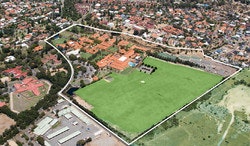Year 12 Geography ATAR
Overview
The Geography ATAR course provides a structured, disciplinary framework to investigate and analyse a range of challenges and associated opportunities facing Australia and the global community. These challenges include rapid change in biophysical environments, the sustainability of places, dealing with environmental risks, and the consequences of international integration. The course aims to develop students' understandings, skills, knowledge and values to ensure they are well placed for tertiary study and/or employment.
Topics
Unit 3: Global environmental change
The impact of land cover transformations with particular reference to climate change or biodiversity loss.
By the end of this unit, students:
- understand the nature, extent and causes of the changing land cover of the Earth's surface, including the emergence of anthropogenic biomes, and evaluate projections of future changes in global land cover
- understand the local and regional effects of land cover change on ecosystems, and the interrelationships between land cover change and either global climate change or biodiversity loss
- understand and apply key geographical concepts as part of a geographical inquiry, including place, space, environment, interconnection, sustainability, scale and change
- evaluate the sustainability of a program aimed at alleviating the negative impacts of land cover change by considering its environmental, economic and social benefits and costs
- apply geographical inquiry and a range of skills, including spatial technologies and fieldwork, to evaluate land cover change and its consequences and sustainable solutions.
Unit 4: Planning sustainable places
The challenges in designing urban places to render them more productive, vibrant and sustainable and peoples varying responses to these challenges.
By the end of this unit, students:
- understand the processes resulting in changes in places and how the places investigated can be made more sustainable
- understand the outcomes of the processes creating change in different communities
- understand and apply key geographical concepts - including place, space, environment, interconnection, sustainability, scale and change - as part of a geographical inquiry
- gather and analyse primary and secondary data to reveal trends in, and relationships between, the processes resulting in change in places
- apply geographical inquiry and a range of skills, including spatial technologies and fieldwork, to investigate a challenge associated with the sustainability of places
- evaluate alternative planning strategies or proposals to manage a selected challenge.
Assessments
Geographical Inquiry: 15% | Fieldwork & Practical Exercises: 15% | Short/Extended Responses, including In-class essays: 30 % | Examinations: 40%
Reporting
A grade will be assigned following the completion of the course unit.
|
Grade
|
Interpretation
|
|
A
|
Excellent achievement
|
|
B
|
High achievement
|
|
C
|
Satisfactory achievement
|
|
D
|
Limited achievement
|
|
E
|
Very low achievement
|
Each grade is based on the student's overall performance for the course unit as judged by reference to a set of pre-determined standards. These standards are defined by grade descriptions.
Student Expectations/Homework
Students will be expected to complete approximately 3 hours of homework each week. This time should be spent consolidating material covered in class as well as any assigned tasks.
